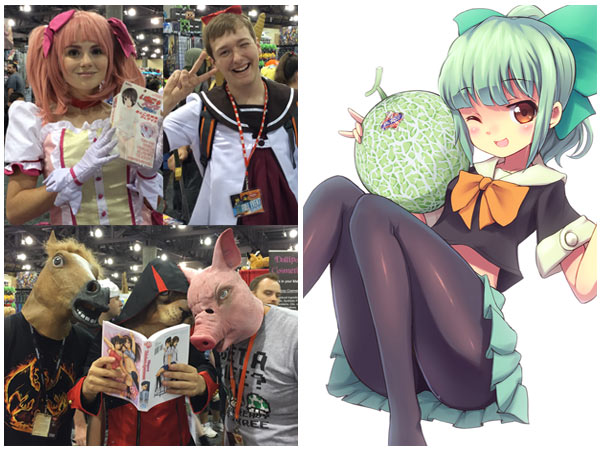As usual, we had a great time at the Phoenix Comicon, connecting with our many excellent customers and talking Sailor Moon cosplay with waitresses at Hooters. One reason I love anime and related fandom is that it’s a “big tent” that contains many smaller sub-groups, from lovers of mainstream shows like Kill la Kill or Attack on Titan to fans of the indies shooting game and subculture creation engine Touhou to yaoi and BL buffs. Fandom is the same around the world, too, and if I were to visit far-off lands like Russia or France or Mexico, I know I’d be able to geek out with fans there about what their favorite visual novels were, or which generation of Pokemon was best, even if we didn’t share a single bit of language in common. Fandom is great for another reason: it often provides a warm, safe place where people can find friendship with like-minded folks who share the same passions. Last year I met a fan who seemed to have some anxiety and other personal issues going on in their lives, enough so that I was concerned about their safety and well-being. Happily I saw the fan again this year, and they were doing much better, running with a group of friends and looking much happier. It really made me smile.
If you read Japan-related news websites, you’re likely to see certain categories of articles. Various economic news blurbs, reports on the latest earthquake, or if it’s in the winter, the occasional tragic story of a family involved in a fire, since Japan is a country in which often-elderly people heat their wood-and-paper houses with portable kerosene heaters rather than central heating. Another article you’re likely to see is something like “pair of honeydew melons sold at auction for 1.5 million yen” (currently around US$12,000), which happened a week ago. How can a pair of everyday melons possibly be worth that kind of money? First of all, Japan has a tradition of celebrating “premium” foods that have been carefully prepared, from $200 “square” watermelons grown in special frames to high-end Kobe beef which comes from cows that were lovingly massaged and fed beer by the farmers every day. Individuals or businesses might bid up the price of melons as a kind of charitable act intended to draw media attention to the region where the melons were grown, to help all the farmers from that area sell their more reasonably-priced produce. Finally, Japan has a strong tradition of giving gifts in July and December to people who have helped you recently, from neighbors to teachers to one’s boss. If you really wanted to make a positive impression on someone, giving them a pair of $12,000 melons would probably do the trick.

J-List is proud to offer thousands of products from Japan to our customers around the world. We especially love to bring you random snacks, which you can find in our monthly Snack Subscription, a box of delicious snacks hand-picked by our staff which we send you every month. Another fun area you should explore are the “DIY” snacks by crazy companies like Kracie, which give you strange candy you mix in a little plastic toilet, poop-shaped candy (because poop is considered lucky in Asia), and the cute gummi candy bento you make yourself.
















